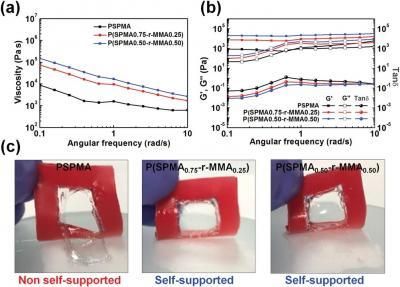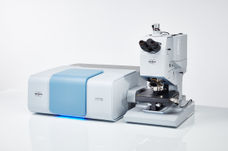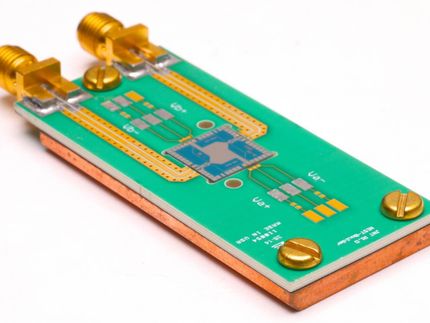A thermometer can be stretched and crumpled by water
Recent outbreaks of the novel coronavirus have emphasized the importance of quarantine and prevention more than ever. When monitoring changes in our body, body temperature is first measured. So, it is very significant to measure the temperature accurately and promptly. With this regard, a research team recently developed a stretchable and crumpling polymer ionic conductor to realize a thermal sensor that could measure body temperature by simple contacts such as wearing clothes or shaking hands and an actuator that could control movements of artificial muscle.

Rheological properties. a) Viscosity profiles and b) storage modulus, loss modulus, and tangent delta (tan δ) profiles from different angular frequency. c) Peel-off tests of PSPMA and P(SPMA-r-MMA)s.
Taiho Park (POSTECH)
Prof. Taiho Park and his student, Junwoo Lee from POSTECH Department of Chemical Engineering developed a thermally stable and flexible ionic conductor by using water solvent on a joint research with Nanyang Technological University for the first time.
Various materials for ionic conductors have been developed, however, with limitations to overcome. A semiconductor device used in most of the electronic devices has a problem with diminished electronic performances due to mechanical stress when it is stretched or contracted. Also, a rubber with nano-silver particle requires a difficult process and is not transparent. Hydrogel ions are easily dried out and lose their flexibility.
To solve these problems, the research team designed a P (SPMA-r-MMA) polymers with different ratios of ionic side chain and chemically linked ionic materials with polymer chains. When making an ionic conductor, it is critical to have a solution process at room temperature. So, the newly developed polymer ionic conductor was processed with water as a solvent and covered with thin film. The process was much simpler than the conventional ones and it did not use toxic solvent and could be mass-produced.
The chemically linked ionic conductor was thermally stable and stretchable. Also, it was self-healable that could recover its structures when it was ripped or broken. The research team used this ionic conductor to realize an actuator thermally stable up to 100°C and a flexible thermal sensor applicable to a body for the first time.
Junwoo Lee who performed the research said, "This is the first example of developing a polymer ionic conductor, which is used in a next-generation stretchable device, by facilitating a water solvent instead of a toxic chemical solvent. The polymer ionic conductor that we developed this time is stretchable, self-healable and thermally stable. For this reason, we anticipate that our research will impact greatly on the stretchable wearable electronic device industry."
Original publication
Other news from the department science
These products might interest you

Eclipse by Wyatt Technology
FFF-MALS system for separation and characterization of macromolecules and nanoparticles
The latest and most innovative FFF system designed for highest usability, robustness and data quality

HYPERION II by Bruker
FT-IR and IR laser imaging (QCL) microscope for research and development
Analyze macroscopic samples with microscopic resolution (5 µm) in seconds

Get the chemical industry in your inbox
By submitting this form you agree that LUMITOS AG will send you the newsletter(s) selected above by email. Your data will not be passed on to third parties. Your data will be stored and processed in accordance with our data protection regulations. LUMITOS may contact you by email for the purpose of advertising or market and opinion surveys. You can revoke your consent at any time without giving reasons to LUMITOS AG, Ernst-Augustin-Str. 2, 12489 Berlin, Germany or by e-mail at revoke@lumitos.com with effect for the future. In addition, each email contains a link to unsubscribe from the corresponding newsletter.


























































